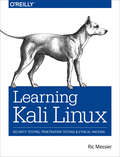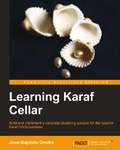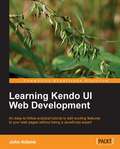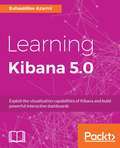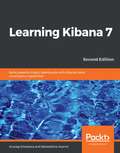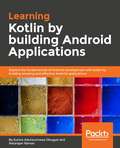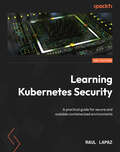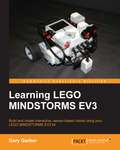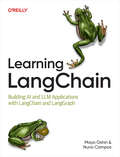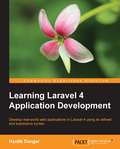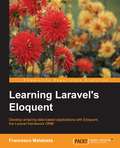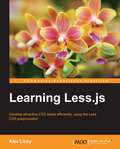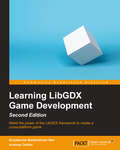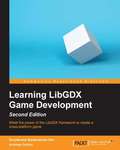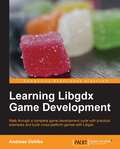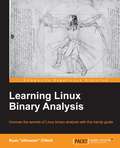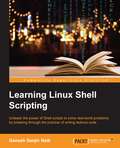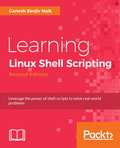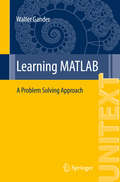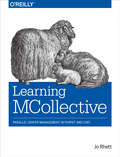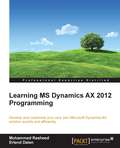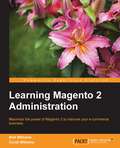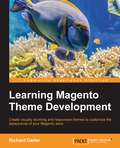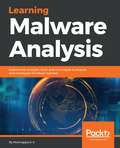- Table View
- List View
Learning Kali Linux: Security Testing, Penetration Testing, and Ethical Hacking
by Ric MessierWith more than 600 security tools in its arsenal, the Kali Linux distribution can be overwhelming. Experienced and aspiring security professionals alike may find it challenging to select the most appropriate tool for conducting a given test. This practical book covers Kali’s expansive security capabilities and helps you identify the tools you need to conduct a wide range of security tests and penetration tests. You’ll also explore the vulnerabilities that make those tests necessary.Author Ric Messier takes you through the foundations of Kali Linux and explains methods for conducting tests on networks, web applications, wireless security, password vulnerability, and more. You’ll discover different techniques for extending Kali tools and creating your own toolset.Learn tools for stress testing network stacks and applicationsPerform network reconnaissance to determine what’s available to attackersExecute penetration tests using automated exploit tools such as MetasploitUse cracking tools to see if passwords meet complexity requirementsTest wireless capabilities by injecting frames and cracking passwordsAssess web application vulnerabilities with automated or proxy-based toolsCreate advanced attack techniques by extending Kali tools or developing your ownUse Kali Linux to generate reports once testing is complete
Learning Karaf Cellar
by Jean-Baptiste OnofreThis book is a tutorial written with a step-by-step approach to help you implement an optimum clustering solution in Apache Karaf Cellar quickly and efficiently. If you are new to Karaf and want to install and manage multiple Karaf instances by farming or clustering, then this book is for you. If you are a Java developer or a system administrator with basic knowledge of Karaf, you can use this book as a guide. Some background knowledge of OSGi and/or Karaf would be preferred but is not mandatory.
Learning Kendo UI Web Development
by John AdamsA practical tutorial with step-by-step example based approach.This book is for web developers who want to take advantage of cutting edge JavaScript and HTML 5 web site features, but who don't have the time or the knowledge to write all of that code by hand. The reader should be familiar with basic HTML 5 and JavaScript but does not need to be an expert.
Learning Kibana 5.0
by Bahaaldine AzarmiExploit the visualization capabilities of Kibana and build powerful interactive dashboards About This Book • Introduction to data-driven architecture and the Elastic stack • Build effective dashboards for data visualization and explore datasets with Elastic Graph • A comprehensive guide to learning scalable data visualization techniques in Kibana Who This Book Is For If you are a developer, data visualization engineer, or data scientist who wants to get the best of data visualization at scale then this book is perfect for you. A basic understanding of Elasticsearch and Logstash is required to make the best use of this book. What You Will Learn • How to create visualizations in Kibana • Ingest log data, structure an Elasticsearch cluster, and create visualization assets in Kibana • Embed Kibana visualization on web pages • Scaffold, develop, and deploy new Kibana & Timelion customizations • Build a metrics dashboard in Timelion based on time series data • Use the Graph plugin visualization feature and leverage a graph query • Create, implement, package, and deploy a new custom plugin • Use Prelert to solve anomaly detection challenges In Detail Kibana is an open source data visualization platform that allows you to interact with your data through stunning, powerful graphics. Its simple, browser-based interface enables you to quickly create and share dynamic dashboards that display changes to Elasticsearch queries in real time. In this book, you'll learn how to use the Elastic stack on top of a data architecture to visualize data in real time. All data architectures have different requirements and expectations when it comes to visualizing the data, whether it's logging analytics, metrics, business analytics, graph analytics, or scaling them as per your business requirements. This book will help you master Elastic visualization tools and adapt them to the requirements of your project. You will start by learning how to use the basic visualization features of Kibana 5. Then you will be shown how to implement a pure metric analytics architecture and visualize it using Timelion, a very recent and trendy feature of the Elastic stack. You will learn how to correlate data using the brand-new Graph visualization and build relationships between documents. Finally, you will be familiarized with the setup of a Kibana development environment so that you can build a custom Kibana plugin. By the end of this book you will have all the information needed to take your Elastic stack skills to a new level of data visualization. Style and approach This book takes a comprehensive, step-by-step approach to working with the visualization aspects of the Elastic stack. Every concept is presented in a very easy-to-follow manner that shows you both the logic and method of implementation. Real world cases are referenced to highlight how each of the key concepts can be put to practical use.
Learning Kibana 7: Build powerful Elastic dashboards with Kibana's data visualization capabilities, 2nd Edition
by Bahaaldine Azarmi Anurag SrivastavaA beginner's guide to analyzing and visualizing your Elasticsearch data using Kibana 7 and Timelion Key Features Gain a fundamental understanding of how Kibana operates within the Elastic Stack Explore your data with Elastic Graph and create rich dashboards in Kibana Learn scalable data visualization techniques in Kibana 7 Book Description Kibana is a window into the Elastic Stack, that enables the visual exploration and real-time analysis of your data in Elasticsearch. This book will help you understand the core concepts of the use of Kibana 7 for rich analytics and data visualization. If you're new to the tool or want to get to grips with the latest features introduced in Kibana 7, this book is the perfect beginner's guide. You'll learn how to set up and configure the Elastic Stack and understand where Kibana sits within the architecture. As you advance, you'll learn how to ingest data from different sources using Beats or Logstash into Elasticsearch, followed by exploring and visualizing data in Kibana. Whether working with time series data to create complex graphs using Timelion or embedding visualizations created in Kibana into your web applications, this book covers it all. It also covers topics that every Elastic developer needs to be aware of, such as installing and configuring Application Performance Monitoring (APM) servers and agents. Finally, you'll also learn how to create effective machine learning jobs in Kibana to find anomalies in your data. By the end of this book, you'll have a solid understanding of Kibana, and be able to create your own visual analytics solutions from scratch. What you will learn Explore the data-driven architecture of the Elastic Stack Install and set up Kibana 7 and other Elastic Stack components Use Beats and Logstash to get input from different data sources Create different visualizations using Kibana Build enterprise-grade Elastic dashboards from scratch Use Timelion to play with time series data Install and configure APM servers and APM agents Work with Dev Tools, Spaces, Graph, and other important tools Who this book is for If you're an aspiring Elastic developer or data analysts, this book is for you. You'll also find it useful if you want to get up to speed with the new features of Kibana 7 and perform data visualization on enterprise data. No prior knowledge of Kibana is expected, but some experience with Elasticsearch will be helpful.
Learning Kotlin by building Android Applications: Explore the fundamentals of Kotlin by building real-world Android applications
by Eunice Adutwumwaa Obugyei Natarajan RamanLearn programming in Kotlin including data types, flow control, lambdas, object-oriented, and functional programming while building 3 Android AppsKey FeaturesExperience the gentle learning curve of Kotlin as you develop your own applicationsLearn how to integrate Kotlin into Android Studio 3 and use it in your projectsBuild real-world applications such as Googly Eyes and games using KotlinBook DescriptionToday Kotlin is an official programming language for Android development and is widely adopted. Kotlin is expressive, concise, and powerful. It also ensures seamless interoperability with existing Android languages like JAVA and C++, which means that it's even easier for developers to use. This book adopts a project-style approach, where we focus on teaching Android development by building three different Android Application: a Tic-Tac-Toe application, a location- based alarm and a To-Do list application.The book begins by giving you a strong grasp of the Kotlin language and its APIs as a preliminary to building stunning applications for Android. You'll learn to set up an environment and as you progress through the chapters and the building of the different applications, the difficulty level will steadily grow.The book also introduces you to the Android Studio IDE, which plays an integral role in Android Development. It covers Kotlin's basic programming concepts such as functions, lambdas, properties, object-oriented code, safety aspects and type parameterization, testing, and concurrency, and helps you write Kotlin code to production.Finally, you'll be taken through the process of releasing your app on the Google Play Store. You will also be introduced to other app distribution channels such as Amazon App Store.As a bonus chapter, you will also learn how to use the Google Faces API to detect faces and add fun functionalities.What you will learnLearn the basics of using the Android Studio IDE and a number of basic programming concepts in KotlinDiscover Android development by building Android apps with KotlinUncover some amazing features of Kotlin that give it the upper hand over JavaLearn about Kotlin interoperability with JavaIntegrate Crashlytics for crash reporting and beta testing.Use Google Location services and understand various APIs available for getting user location updatesUnderstand the principles of networking and communication. Learn about the usage of third-party libraries for loading of dataAutomate your build process with continuous integration tools Who this book is forIf you are completely new to Kotlin or the Android platform and need to publish Android applications for fun or for business purposes, but you have no clue where to start, then this book is for you. This book is also for advanced Android developers who want to learn to use Kotlin instead of/alongside Java for Android development, although having some programming experience would be helpful.
Learning Kubernetes Security: A practical guide for secure and scalable containerized environments
by Raul LapazGet practical, hands-on experience in Kubernetes security—from mastering the fundamentals to implementing advanced techniques to safeguard your Kubernetes deployments against malicious threatsKey FeaturesUnderstand Kubernetes security fundamentals through real-world examples of threat actor tacticsNavigate the complexities of securing container orchestration with practical, expert insightsDeploy multiple Kubernetes components, plugins, and third-party tools to proactively defend against cyberattacksPurchase of the print or Kindle book includes a free PDF eBookBook DescriptionWith readily available services, support, and tools, Kubernetes has become a foundation for digital transformation and cloud-native development, but it brings significant security challenges such as breaches and supply chain attacks. This updated edition equips you with defense strategies to protect your applications and infrastructure while understanding the attacker mindset, including tactics like container escapes and exploiting vulnerabilities to compromise clusters. The author distills his 25+ years of experience to guide you through Kubernetes components, architecture, and networking, addressing authentication, authorization, image scanning, resource monitoring, and traffic sniffing. You’ll implement security controls using third-party plugins (krew) and tools like Falco, Tetragon, and Cilium. You’ll also secure core components, such as the kube-apiserver, CoreDNS, and kubelet, while hardening images, managing security contexts, and applying PodSecurityPolicy. Through practical examples, the book teaches advanced techniques like redirecting traffic from misconfigured clusters to rogue pods and enhances your support incident response with effective cluster monitoring and log analysis. By the end of the book, you'll have a solid grasp of container security as well as the skills to defend your clusters against evolving threats.What you will learnImplement Kubernetes security best practices, from threat detection to network protectionBuild strong security layers and controls using core Kubernetes componentsApply theory through hands-on labs to secure Kubernetes systems step by stepUse security plugins and open-source tools to help mitigate container-based threatsSet up monitoring and logging to quickly detect and respond to cybersecurity threatsAnalyze attacker tactics to build stronger cluster defense strategiesWho this book is forThis book is for DevOps and Platform teams managing Kubernetes environments. As security is a shared responsibility, it also addresses on-premises and cloud security professionals, as well as beginner and advanced incident responders. No expert knowledge is required; a basic tech background is all you need as this book covers Kubernetes fundamentals and security principles, delivering practical insights for anyone looking to stay current with modern tech and strengthen their security skills.
Learning LEGO MINDSTORMS EV3
by Gary GarberThis book is for the hobbyists, builders, and programmers who want to build and control their very own robots beyond the capabilities provided with the LEGO EV3 kit. You will need the LEGO MINDSTORMS EV3 kit for this book. The book is compatible with both the Home Edition and the Educational Edition of the kit. You should already have a rudimentary knowledge of general programming concepts and will need to have gone through the basic introductory material provided by the official LEGO EV3 tutorials.
Learning LangChain: Building AI and LLM Applications with LangChain and LangGraph
by Mayo Oshin Nuno CamposIf you're looking to build production-ready AI applications that can reason and retrieve external data for context-awareness, you'll need to master--;a popular development framework and platform for building, running, and managing agentic applications. LangChain is used by several leading companies, including Zapier, Replit, Databricks, and many more. This guide is an indispensable resource for developers who understand Python or JavaScript but are beginners eager to harness the power of AI.Authors Mayo Oshin and Nuno Campos demystify the use of LangChain through practical insights and in-depth tutorials. Starting with basic concepts, this book shows you step-by-step how to build a production-ready AI agent that uses your data.Harness the power of retrieval-augmented generation (RAG) to enhance the accuracy of LLMs using external up-to-date dataDevelop and deploy AI applications that interact intelligently and contextually with usersMake use of the powerful agent architecture with LangGraphIntegrate and manage third-party APIs and tools to extend the functionality of your AI applicationsMonitor, test, and evaluate your AI applications to improve performanceUnderstand the foundations of LLM app development and how they can be used with LangChain
Learning Laravel 4 Application Development
by Hardik DangarThis book is written in a simple and easy-to-understand manner, with each chapter contributing as a standalone project that will give you as a reader something to reflect on as you're learning.This book is aimed at amateur PHP developers with a desire to get a firm understanding of the Lavarel 4 framework. Basic knowledge of PHP will be helpful, however in-depth knowledge is not a must.
Learning Laravel's Eloquent
by Francesco MalatestaThis book is perfect for developers with some basic knowledge of PHP development, but are new to the Eloquent ORM. However, developers with previous Laravel and Eloquent experience will also benefit from the in-depth analysis of specific classes and methodologies in the book.
Learning Less.js
by Alex LibbyIf you are a designer or developer who wants to quickly learn how to harness the power of Less.js to write more efficient CSS styles that can be applied to a website of any size, then this book is for you. This book will help you master both the basic functions and advanced features of Less.js. It would be helpful to have some familiarity of writing CSS styles, although no prior experience of using CSS preprocessors is required.
Learning LibGDX Game Development - Second Edition
by Andreas Oehlke Suryakumar Balakrishnan NairThis book is aimed at indie and existing game developers as well as those who want to get started with game development using LibGDX. Basic knowledge of Java programming and game development is required.
Learning LibGDX Game Development Second Edition
by Andreas Oehlke Suryakumar Balakrishnan Nair<P><P>Wield the power of the LibGDX framework to create a cross-platform game <P><P>About This Book <P><P>Write your game code once and run it on a multitude of platforms using LibGDX <P><P>Learn about the key features of LibGDX that will ease and speed up your development cycles <P><P>An easy-to-follow, comprehensive guide that will help you develop games in LibGDX successfully <P><P>Who This Book Is For <P><P>This book is aimed at indie and existing game developers as well as those who want to get started with game development using LibGDX. Basic knowledge of Java programming and game development is required. <P><P>What You Will Learn <P><P>Set up a cross-platform project using Gradle and test the base code required for game building <P><P>Speed up your overall productivity with the stunning JVM Code Hot Swapping feature <P><P>Use Scene2D to create and organize complex menu structures <P><P>Automate the creation of texture atlases using TexturePacker <P><P>Manage and play audio files and add special effects to your game to improve its look and feel <P><P>Learn 2D physics simulation using Box2D <P><P>Understand more about 3D programming using the new LibGDX 3D API <P><P>Use the LibGDX Bullet wrapper for 3D physics simulation <P><P>In Detail <P><P>LibGDX is a multiplatform game development framework, and is one of the most popular frameworks for building games, providing a comprehensive set of development capabilities and features to use and incorporate into games. <P><P>This book starts off by introducing you to LibGDX and how to use its project setup tool to build an application that can support multiple platforms, before gradually moving on to configuring your game. Then, you will learn to organize resources, create a scene, actors, and a menu system. You will also enhance the visual appearance of your game and manage its transitions, along with music and sound effects. You will then move on to cover the advanced programming techniques and create and manage different kinds of animations. <P><P>Finally, you will be introduced to the basics of 3D programming and the 3D physics engine. By the end of this book, you will be able to start developing your very own cross-platform games using the LibGDX framework.
Learning Libgdx Game Development
by Andreas OehlkeA clear and practical guide to building games in libGDX.This book is great for Indie and existing game developers, as well as those who want to get started with game development using libGDX. Java game knowledge of game development basics is recommended.
Learning Linux Binary Analysis
by Ryan O'NeillIf you are a software engineer or reverse engineer and want to learn more about Linux binary analysis, this book will provide you with all you need to implement solutions for binary analysis in areas of security, forensics, and antivirus. This book is great for both security enthusiasts and system level engineers. Some experience with the C programming language and the Linux command line is assumed.
Learning Linux Shell Scripting
by Ganesh Sanjiv NaikUnleash the power of shell scripts to solve real-world problems by breaking through the practice of writing tedious code About This Book * Learn how to efficiently and effectively build shell scripts and develop advanced applications with this handy book * Develop high quality and efficient solutions by writing professional and real-world scripts, and debug scripts by checking and shell tracing * A step-by-step tutorial to automate routine tasks by developing scripts from a basic level to very advanced functionality Who This Book Is For This book is ideal for those who are proficient at working with Linux and who want to learn about shell scripting to improve their efficiency and practical skills. By the end of this book, you will be able to confidently use your own shell scripts in the real world. What You Will Learn * Familiarize yourself with the various text filtering tools available in Linux * Combine the fundamental text and file processing commands to process data and automate repetitive tasks * Understand expressions and variables and how to use them practically * Automate decision-making and save a lot of time and effort of revisiting code * Get to grips with advanced functionality such as using traps and signals and using dialogs to develop screens * Start up a system and customize a Linux system * Take an in-depth look at regular expressions and pattern matching to understand the capabilities of scripting In Detail Linux is the one of the most powerful and universally adopted OSes. Shell is a program that gives the user direct interaction with the operating system. Scripts are collections of commands that are stored in a file. The shell can read this file and act on the commands as if they were typed on the keyboard. Shell scripting is used to automate day-to-day administration, and for testing or product development tasks. This book covers Bash, GNU Bourne Again SHell, preparing you to work in the exciting world of Linux shell scripting. We start with an introduction to the Shell environment and explain basic commands used in Shell. Next we move on to check, kill, and control the execution of processes in Linux OS. Further, we teach you about the filter tools available in Linux and explain standard output and standard errors devices. Then we will ensure you understand Shell's interpretation of commands and get a firmer grasp so you use them in practice. Next, you'll experience some real-world essentials such as debugging and perform Shell arithmetic fluently. Then you'll take a step ahead and learn new and advanced topics in Shell scripting, such as starting up a system and customizing a Linux system. Finally, you'll get to understand the capabilities of scripting and learn about Grep, Stream Editor, and Awk. Style and approach This practical book will go from the very basics of shell scripting to complex, customized automation. The idea behind this book is to be as practical as possible and give you the look and feel of what real-world scripting is like.
Learning Linux Shell Scripting: Leverage the power of shell scripts to solve real-world problems, 2nd Edition
by Ganesh NaikBreak through the practice of writing tedious code with shell scriptsKey FeaturesLearn to impeccably build shell scripts and develop advanced applicationsCreate smart solutions by writing and debugging scriptsA step-by-step tutorial to automate routine tasks by developing scriptsBook DescriptionLinux is the most powerful and universally adopted OS. Shell is a program that gives the user direct interaction with the operating system. Scripts are collections of commands that are stored in a file. The shell reads this file and acts on commands as if they were typed on the keyboard.Learning Linux Shell Scripting covers Bash, GNU Bourne Again Shell, preparing you to work in the exciting world of Linux shell scripting. CentOS is a popular rpm-based stable and secured Linux distribution. Therefore, we have used CentOS distribution instead of Ubuntu distribution. Linux Shell Scripting is independent of Linux distributions, but we have covered both types of distros. We start with an introduction to the Shell environment and basic commands used. Next, we explore process management in Linux OS, real-world essentials such as debugging and perform Shell arithmetic fluently. You'll then take a step ahead and learn new and advanced topics in Shell scripting, such as decision making, starting up a system, and customizing a Linux environment. You will also learn about grep, stream editor, and AWK, which are very powerful text filters and editors. Finally, you'll get to grips with taking backup, using other language scripts in Shell Scripts as well as automating database administration tasks for MySQL and Oracle.By the end of this book, you will be able to confidently use your own shell scripts in the real world.What you will learnFamiliarize yourself with the various text filtering tools available in LinuxUnderstand expressions and variables and how to use them practicallyAutomate decision-making and save a lot of time and effort of revisiting codeGet to grips with advanced functionality such as using traps, dialogs to develop screens & Database administration such as MySQL or OracleStart up a system and customize a Linux systemTaking backup of local or remote data or important files.Use existing other language scripts such as Python, Perl & Ruby in Shell ScriptsWho this book is forLearning Linux Shell Scripting is ideal for those who are proficient at working with Linux and want to learn about shell scripting to improve their efficiency and practical skills.
Learning MATLAB
by Walter GanderThis comprehensive and stimulating introduction to Matlab, a computer language now widely used for technical computing, is based on an introductory course held at Qian Weichang College, Shanghai University, in the fall of 2014. Teaching and learning a substantial programming language aren't always straightforward tasks. Accordingly, this textbook is not meant to cover the whole range of this high-performance technical programming environment, but to motivate first- and second-year undergraduate students in mathematics and computer science to learn Matlab by studying representative problems, developing algorithms and programming them in Matlab. While several topics are taken from the field of scientific computing, the main emphasis is on programming. A wealth of examples are completely discussed and solved, allowing students to learn Matlab by doing: by solving problems, comparing approaches and assessing the proposed solutions.
Learning MCollective
by Jo RhettOrchestrate change across server clusters in near realtime with MCollective, the framework that works in concert with Puppet, Chef, and other configuration management tools. Ideal for system administrators and operations or DevOps engineers at any level, this hands-on guide teaches you how to build and test a real installation of MCollective servers and clients in your environment.Learn how to build an entire installation by hand, know where every configuration file lives, and understand every configuration parameter and what it means. Whether you manage a small environment or one that's immense in scale, this book shows you how to orchestrate specific actions faster and better than you do now.Tour MCollective's architecture, backbone, transport, and security controlsConfigure MCollective components to match your production environmentCreate and use collectives to handle thousands of remote MCollective agentsUse ActiveMQ Network of Brokers to resolve multi-site or redundancy requirementsLearn how to use community-built client and agent plugins, with concrete examplesCreate your own server and client plugins to perform a variety of actionsLearn recommended best practices for using MCollective
Learning MCollective: Parallel Server Management in Puppet and Chef
by Jo RhettOrchestrate change across server clusters in near realtime with MCollective, the framework that works in concert with Puppet, Chef, and other configuration management tools. Ideal for system administrators and operations or DevOps engineers at any level, this hands-on guide teaches you how to build and test a real installation of MCollective servers and clients in your environment.Learn how to build an entire installation by hand, know where every configuration file lives, and understand every configuration parameter and what it means. Whether you manage a small environment or one that’s immense in scale, this book shows you how to orchestrate specific actions faster and better than you do now.Tour MCollective’s architecture, backbone, transport, and security controlsConfigure MCollective components to match your production environmentCreate and use collectives to handle thousands of remote MCollective agentsUse ActiveMQ Network of Brokers to resolve multi-site or redundancy requirementsLearn how to use community-built client and agent plugins, with concrete examplesCreate your own server and client plugins to perform a variety of actionsLearn recommended best practices for using MCollective
Learning MS Dynamics AX 2012 Programming
by Erlend Dalen Mohammed RasheedIf you are a .NET or Java developer who wants to develop and customize Dynamics AX 2012 R3, this book is for you. Some experience with object-oriented development technologies is expected, but no experience in development with AX is required.
Learning Magento 2 Administration
by Bret Williams Cyndi WilliamsMaximize the power of Magento 2 to improve your e-commerce business About This Book * Strategic planning for maximizing your Magento 2 store's operations and sales. * Important guidelines and advice for optimizing your Magento 2 store. * Packed with screenshots and step-by-step instructions to leverage the hundreds of Magento 2 features. Who This Book Is For This guide is for store owners who use Magento 2 on a daily basis to operate their online stores. Proprietors will use this guide as a reference for ensuring that they are utilizing the full power of Magento 2. Developers and solution providers will find this guide a helpful tool in identifying opportunities to help their clients navigate the complexity of Magento 2. What You Will Learn * Strategies for creating multiple stores within a single Magento installation. * Use of complex product types such as bundles, downloadables and virtual products. * Configuring payments, shipping and taxes. * Accommodating multiple languages and currencies. * Installing and configuring themes. * Managing content and search engine optimization. * Creating promotions, up-sells and cross-sells. * Leveraging the customer relationship features of Magento 2. * Securing and optimizing your installation. In Detail Magento 2 has been completely re-written and re-designed to take the world's most popular open source e-commerce platform to new heights of productivity and usability. With this overhaul comes improved opportunities to leverage the world's most successful open source e-commerce platform for your online retail and wholesale business. The focus of this book is on operational aspects: those actions you, as a proprietor, can take to give your customers a more delightful shopping experience. In this guide, we delve into all aspects of managing a Magento 2 store, from product creation to marketing, customer management to search engine optimization. This book is not only a step-by-step course in setting up your Magento 2 website, it will be a handy reference as continue to improve and refine your online presence. Style and approach A step-by-step guide where it takes the reader from the planning step all the way through launching a new Magento-powered store by building on the initial sample data included in a default Magento 2 installation. Along the way, we explore using discrete action steps how to leverage the full power of Magento 2 for both simple and advanced uses. Screenshots and step-by-step instructions not only teach the new Magento store administrator, but also serve as a handy reference for the more experienced operators.
Learning Magento Theme Development
by Richard CarterThis book is for web designers and developers with existing knowledge of CSS, HTML, and XML, who wish to learn more about Magento-specific theming techniques. Some knowledge of PHP may be useful, but is not necessary.
Learning Malware Analysis: Explore the concepts, tools, and techniques to analyze and investigate Windows malware
by Monnappa K AUnderstand malware analysis and its practical implementationKey FeaturesExplore the key concepts of malware analysis and memory forensics using real-world examplesLearn the art of detecting, analyzing, and investigating malware threatsUnderstand adversary tactics and techniquesBook DescriptionMalware analysis and memory forensics are powerful analysis and investigation techniques used in reverse engineering, digital forensics, and incident response. With adversaries becoming sophisticated and carrying out advanced malware attacks on critical infrastructures, data centers, and private and public organizations, detecting, responding to, and investigating such intrusions is critical to information security professionals. Malware analysis and memory forensics have become must-have skills to fight advanced malware, targeted attacks, and security breaches.This book teaches you the concepts, techniques, and tools to understand the behavior and characteristics of malware through malware analysis. It also teaches you techniques to investigate and hunt malware using memory forensics. This book introduces you to the basics of malware analysis, and then gradually progresses into the more advanced concepts of code analysis and memory forensics. It uses real-world malware samples, infected memory images, and visual diagrams to help you gain a better understanding of the subject and to equip you with the skills required to analyze, investigate, and respond to malware-related incidents.What you will learnCreate a safe and isolated lab environment for malware analysisExtract the metadata associated with malwareDetermine malware's interaction with the systemPerform code analysis using IDA Pro and x64dbgReverse-engineer various malware functionalitiesReverse engineer and decode common encoding/encryption algorithmsPerform different code injection and hooking techniquesInvestigate and hunt malware using memory forensicsWho this book is forThis book is for incident responders, cyber-security investigators, system administrators, malware analyst, forensic practitioners, student, or curious security professionals interested in learning malware analysis and memory forensics. Knowledge of programming languages such as C and Python is helpful but is not mandatory. If you have written few lines of code and have a basic understanding of programming concepts, you’ll be able to get most out of this book.
